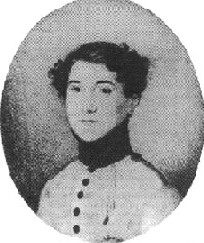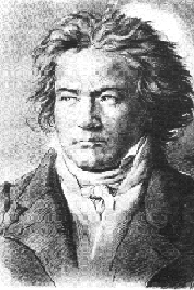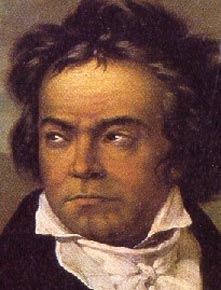 Carl van Beethoven |
The composer's former pupil, Ferdinand Ries, now lived in London, England, and acted for his former teacher as agent there. Various correspondences went back and forth between them as well as between Beethoven and Birchall, Sir Charles Smart and Mr. Neate, all with the aim of enticing the Philharmonic Society to buy his works. Unfortunately, the English were disappointed to receive only occasional works such as overtures. Beethoven's subjectively felt need to market his works extensively so that he could provide for his charge may have been behind these ultimately disappointing endeavors.
This is a good occasion to invite the reader of this brief overview of Beethoven's life to explore for him or herself the complex issue of Beethoven's creative slowdown which had already begun during his grieving process over the Immortal Beloved. The fact that his hearing deteriorated dramatically after that event, the emotional impact it certainly must have had on him, as well as all the trials and tribulations of his struggle for the guardianship of his nephew and the responsibility for his care appears to have formed a powerful combination of facts to "facilitate" this process. On an artistic level, the dramatic change in the political situation of Europe with Napoleon's defeat may have removed all incentive for Beethoven to continue to explore the creative possibilities this style may once have held for him, on the one hand, while, on the other hand, he may have considered that he had already exhausted all creative possibilities of this style.
Beethoven spent the summer in Baden and, on returning to the city, tried to re-arrange his domestic affairs so that he could raise Carl at home. This was not realized due to his problems with his servants. Carl remained at the boarding school.
The year also brought forth Piano Sonata Op. 101, the so-called Ertmann Sonata. While it was usually believed that the creative source of this work may have been the sad occasion of his acquaintance, Baroness Ertmann's loss of her child, this concept would invite further exploration as to its veracity. This 'creative legend' assumed that the baroness had sought out Beethoven in his lodgings where he was to have improvised for her and comforted her with his music.
During the winter of 1816/1817, Beethoven was suffering from the effects of a severe cold he had in October, 1816. The winter months also saw the negotiations between him and Johanna van Beethoven with respect to her financial contribution to Carl's education.
Beethoven spent the summer of 1817 in Nußdorf. In his June 9 letter, Ferdinand Ries conveyed to Beethoven the invitation to London for the following winter by the Philharmonic Society. Beethoven was requested to write two symphonies for that purpose. Negotiations went on, but nothing came of the entire project. Rather than working on the requested symphonies, Beethoven began to write his Op. 106, the Hammerklavier Sonata. Amongst its sketches can be found early sketches for the Scherzo of the Ninth Symphony.
One of the underlying reasons for Beethoven's "dragging his feet" with the travel plans for England may have been his increasing deafness. Thayer (690) mentions Czerny's recollections that by 1817, Beethoven could barely hear music, anymore. Evidence of this may be seen in Beethoven's July 7, 1817 letter to Madame Streicher, asking her to have her piano maker husband comply with the following:
" . . . Now I have to ask a big favor of Streicher; ask him in my name that he kindly tunes one of your pianos more for my weakened hearing. It should be tuned to produce an as loud as possible sound for my use."
Mälzel returned to Vienna to get positive endorsements for his metronome. The lawsuit with Beethoven was amicably settled. Beethoven once again joined forces with those who endorsed Mälzel's metronome.
Beethoven's letter of November 1st to the Giannatasios indicated that he once again aimed at taking Carl home.
In early 1818, a Broadwood Piano was sent by Beethoven's friends to the composer in Vienna. Beethoven thanked Broadwood in his letter of February 3 (written in French). Stumpff of London tuned the piano for him when he was in Vienna during that year. Thayer reports that, after Beethoven's death, the Broadwood Piano was bought by the music publisher Spina "for 181 florins; Spina gave it to Liszt, in whose house at Weimar it was up to his death. In 1887, Princess Hohenlohe, the daughter of Liszt's friend, Princess Sayn-Wittgenstein, presented it to the National Museum in Buda-Pesth" (Thayer: 696).
Carl was to leave Giannatasio's school at the end of January. Beethoven engaged a tutor for Carl to prepare him for the gymnasium entry exams. This experiment was not successful.
With respect to Beethoven's health is to report that from March 1818 on, he could only communicate through the conversation books.
Beethoven spent the summer at Mödling, leaving on May 17th with Carl. Johanna van Beethoven bribed Beethoven's servants so that she could see her son. Carl attended the Reverend Father Froehlich's class.
August Kloeber, a young Breslau artist studying in Vienna, had Beethoven "sit for him" at Mödling for his charcoal sketch to a painting which has been lost. The charcoal sketch of Beethoven's head i
 Beethoven Sketch by Kloeber |
Johanna van Beethoven petitioned to obtain custody of her son Carl. Proceedings began and were temporarily dismissed by the Landrecht on September 18th. Carl was at that time a student of the Grammar Class. Beethoven took up socializing with the Giannatasios again. Around December 3rd - 5th, Carl ran away from Beethoven to his mother, as Fanny Giannatasio's diary entry shows. With the help of the Giannatasios, Carl was returned to Beethoven by the police. Johanna van Beethoven applied to the Court again on December 11th. The Landrecht dismissed the case on December 18th and referred it to the Magistrate, due to the fact that Beethoven was not a member of the nobility, as the van in his name generally led the Viennese to believe and which Beethoven never actively tried to clarify, either.
Beethoven completed his Op. 106 in 1818 and also worked on his first sketches for the Ninth Symphony again. His notes from the summer in Mödling also show first ideas on a new mass. This should be quoted here to bear testimony to what went on in Beethoven's mind rather than only in his "outer life":
"In order to write church music . . . Look through all the monastic church chorals and also to the strophes in the most correct translations and perfect prosody in all Christian Catholic psalms and hymns generally."
"Sacrifice again all the pettiness of social life to your art. O God above all things! For it is an eternal providence which directs omnisciently the good and evil fortunes of human men."
"Tranquilly will I submit myself to all vicissitudes and place my sole confidence in Thy unalterable goodness, o God! My soul shall rejoice in thy immutable servant. Be my rock, my light, forever my trust!" (Thayer: 715).
With respect to the new mass, an actual occasion to write it arose in 1819: Archduke Rudolph had been appointed as Cardinal and Archbishop of Olmütz. The date of the installation was to be March 20th, 1820. In his letter of early June, Beethoven congratulated the Archduke and declared that he wanted to have his new Mass ready for the festive occasion. He had actually begun first sketches for the Missa in the late fall of 1818; more preliminary work was underway in the early part of 1819.
In early 1819, the Magistrate suspended Beethoven's guardianship of Carl, who went to stay with his mother for a few weeks. On February 11th, Beethoven submitted to the Magistrate in writing his plan for Carl's education and upbringing. At the end of March, however, it was felt prudent that Beethoven should temporarily resign from his guardianship. On March 26th, the Magistrate appointed Magisterial Councillor von Tuscher as Carl's Guardian (Thayer: 722).
Beethoven went to Mödling on May 12th. Carl was sent to the institute of Mr. Blöchlinger, a follower of Pestalozzi's educational methods. On July 5th, von Tuscher applied to be relieved of Carl's guardianship. On September 17th, the Magistrate awarded guardianship of Carl to Johanna van Beethoven, with the Municipal Official Leopold Nussboeck as co-guardian. The Magistrate disposed of Beethoven's protest on November 4th and issued a decree to that effect on December 20th.
With respect to musical events in Beethoven's life is to report that on January 17th, Beethoven appeared as conductor at a benefit concert of the widows and orphans of the Vienna Law Faculty, that he was elected honorary member of the Philharmonic Society of Laibach, and honorary member of the Mercantile Association on October 1st. Ferdinand Schimon portrayed Beethoven while he was writing on the Missa Solemnis.
 Beethoven Portrait by Schimon |
In October, Beethoven returned to Vienna. During the year, he worked on the Mass with occasional excursions to the Ninth Symphony, and on early sketches for the Diabelli Variations.
The close of the year saw the return to Vienna of his good friend Countess Erdödy. Her staff were questioned by the Vienna police with respect to the 1816 death of her son August. These intrigues were instigated by her sister-in-law.
The legal proceedings with respect to Carl continued. Beethoven filed a petition with the Court of Appeals on January 7th. He asked for the appointment of a co-guardian because of his "somewhat bad hearing". He suggested Herr Peters, the private tutor of Prince Lobkowitz' children. Part of his appeal reads as follows:
" . . . My will and my striving is only aimed at providing the best education for the boy, since his talents would allow the highest hopes, and at fulfilling his blessed father's hopes which the latter based on my brotherly love. The young tree can still be bent, but if more time will be lost, it will grow into a crooked shape out of the hands of the gardener, and the building of an upright character and the instilling of knowledge will be lost forever. I know of no duty more sacred than the care that is to be taken in the raising and education of a child. The purpose of the supervision of this guardianship should only be to appreciate the good [of these high aims] and to ordain the necessary. Only then will it have dedicated its proper care to the benefit and well-being of the child. To prevent the good, however, would mean that it has neglected its duty."
On April 8th, the Appellate Court decided in Beethoven's favor and Peters was appointed co-guardian. Johanna's counter-appeal to the Emperor failed. The Magistrate advised all parties of this.
These ongoing proceedings may have delayed Beethoven's progress in the writing of the Mass. It was not ready for the Archduke's Ceremony on March 20th. However, Beethoven continued to work on it. At about the same time, we can see the beginning of the process of Beethoven's "marketing" of his work. He wrote to his old Bonn friend and music publisher Nikolaus Simrock about it.
Beethoven spent the summer once again in Mödling. In addition to his writing the Mass, he now also projected the Piano Sonatas, Op. 109 - 111. Op. 109 clearly belongs to 1820. He dedicated this work to Antonie Brentano's daughter Maximiliane. Beethoven also appears to have been concerned with the publication of his complete works. He is reported as having discussed this with his friends.
The closing in 1820 of the guardianship proceedings may have allowed Beethoven's attention to be returned to his artistic endeavors, the fruits of which we shall see unfold in the next section.